How To Make An Effective Software Development Team – A Complete Guide

A software development team works as a productivity unit and assists in framing winning software-driven strategies. The choice of a software dev team can thus make and break your plans, which is why you must read through this guide and understand its various facets.
The idea of team building originated when Elton Mayo experimented with it at Western Electric Hawthorne Works, Cicero, Illinois, in the United States between 1927 to 1932. Mayo’s research set a future course for forming employee groups and building effective teams.
After going through multiple phases, team building became an educational process centered around productivity and quality. The rise of information technology brought into existence the concept of a software dev team, and the idea of a team underwent a sea change.
Software has emerged as a well-known paradigm in the twenty-first century. Having a software application is an ambitious goal of each business today. Irrespective of whether they can manage the task in-house or need to bank on an outsourced software developer team, businesses are determined to build a good product.
Assembling experts with skills relevant to your projects is the foremost challenge when forming teams. Most businesses thus prefer to outsource their projects.
As we move ahead, we dig deeper into discussing some crucial dimensions of a software dev team.
What is a Software Development Team?
A team of experts who work together to achieve the common goal of developing a software product makes a software development teams. There are internal as well as external stakeholders in the team, each playing a certain role and accountable for some contribution.
Since the evolution of software applications, software teams have evolved in terms of character and structure. Today’s teams are agile and optimally composed. The focus is on optimizing resource utilization while maximizing productivity.
A software dev team is just made up of developers and engineers is a constrained view. Non-technical professionals, too, play a vital role in software development project success. The imperative is that both technical and non-technical members have to be well-versed with the principles of software engineering.

Types of Software Development Teams
Based on the composition of team members and their skills, usually, software development teams assume three forms, which we discuss in brief, below.
Generalists
A software dev team of ‘generalist’ nature as the term conveys comprises members who possess wide-ranging skills and knowledge. This sort of team works under ideal conditions where there is a flow of regular requirements and encountering deviations, the team needs to be reinforced with expert resources.
An example would be a team in which all are developers, each having some knowledge of testing and project management. However, addressing hitherto unaddressed testing problems and obtaining precise project estimates might be out of the bounds for team members.
Specialists
When a software delivery team has a highly expert professional for each of the required fields that are important to software development, the team becomes a team of ‘specialists’. Each member of the team carries vast exposure in the respective field and is an industry expert in the area.
In a team of specialists, each member brings the best of the knowledge and improves the efficiency to deliver high-quality output. On the flip side, members may choose to work independently, leading to communication constraints and a lack of coherence amongst team members.
Hybrid
A hybrid team is a combination of specialists and generalists. So, you don’t want the project to suffer on the account of a lack of expertise. While specialists would handle the specifics of the situation, generalists would carry out the common but essential tasks in the project. Considering the dynamic requirements of today’s software development projects, hybrid is the most feasible type.
Communication is key to ensuring the effectiveness of hybrid teams, so transparent channels need to exist for open discussions. Also, individuals bring different approaches to work. Having a standard coordination framework helps to synthesize these approaches, bringing members on the same page.
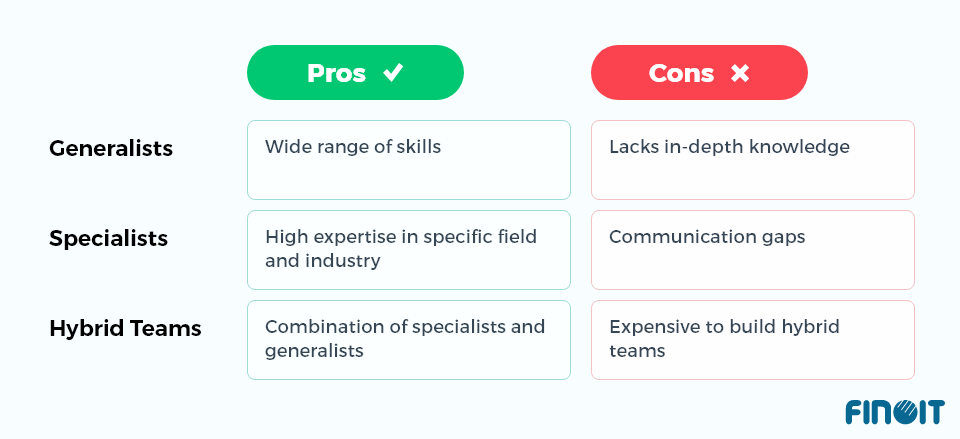
Understanding different Roles in Software Development Team and their Responsibilities
Below we outline different roles in a typical software dev team and the responsibilities associated with each role.
Product Owner
A product owner formulates strategies for product success and defines the vision for reaching the goals. Building product roadmaps and guiding members along the strategic plan is the most vital function of a product owner. This role is thus responsible for maximizing the product as well as the business value.
Project Manager
Expert in managing niceties of software development, project managers are responsible for planning and execution of the development process in an optimal manner. Typical tasks that come within the ambit of project managers include defining project milestones, charting out completion plans, maintaining schedules, allocating resources, assigning tasks, and monitoring performance.
Technical Lead
A technical lead takes complete ownership of managing the technical facets of the product. A person in this role spearheads technical development and oversees the working of technical developers/programmers. A technical lead works as an individual contributor and guides the technical efforts in the intended direction.
Software Architect
This is an expert role, and the person in the capacity possesses excellent knowledge of the software system and the components. A software architect acts as a consultant who guides in the adoption of the right processes, technologies, and frameworks that would best serve the interest of the given project.
Programmer / Developer
Programmers or software developers make the crux of software development. At a high level, they are programming experts who develop code, program logic and deploy and maintain the software application. Based on project requirements, a software delivery team will have a mix of full-stack developers, front-end developers, and back-end developers.
UI/UX Designer
UI/UX designers are a core component of modern software delivery teams. They design interactive user interfaces to offer the best user experience. Teams may also have separate specialists for UI (user interface) and UX (user experience) since these are two different aspects, though closely affecting and related to each other.
Business Analyst
Business analysts (BA) are technical experts with a sound understanding of a business domain. They act as a bridge between the delivery team and the client and are responsible for requirements gathering. Driving analytics and delivering data-driven insights to top management for process improvement also come within their scope.
Quality Assurance (QA) Specialist
The quality considerations of a software application are managed by QA professionals. Depending upon the decision of the management, they may assume different designations like Quality Assurance (QA) Engineer, Test Engineer, etc. However, in general, they are responsible for testing the product and ensuring that it meets defined quality criteria.
DevOps Specialist
Today’s new-age software teams have dedicated DevOps specialists/DevOps Engineers. They are tasked with the responsibility of combining codes and application maintenance and management. A DevOps professional plays an important role in streamlining the DevOps culture – practices and tools that make it and help fuse software development with IT operations.
Scrum Master
Software development projects work on the agile framework these days, and it is a Scrum Master who specializes in employing the Agile project management framework. As a facilitator of the agile development process, the Scrum master develops scrum values and practices and paves a way for a flexible and iterative workflow.
Technical Writer
Some teams will also have technical writers. In most software development firms, technical writers don’t work on a single project, rather their role spans across multiple projects and activities. Since technical writers streamline documentation, even if they don’t form a part of the core team, their role shouldn’t go ignored.
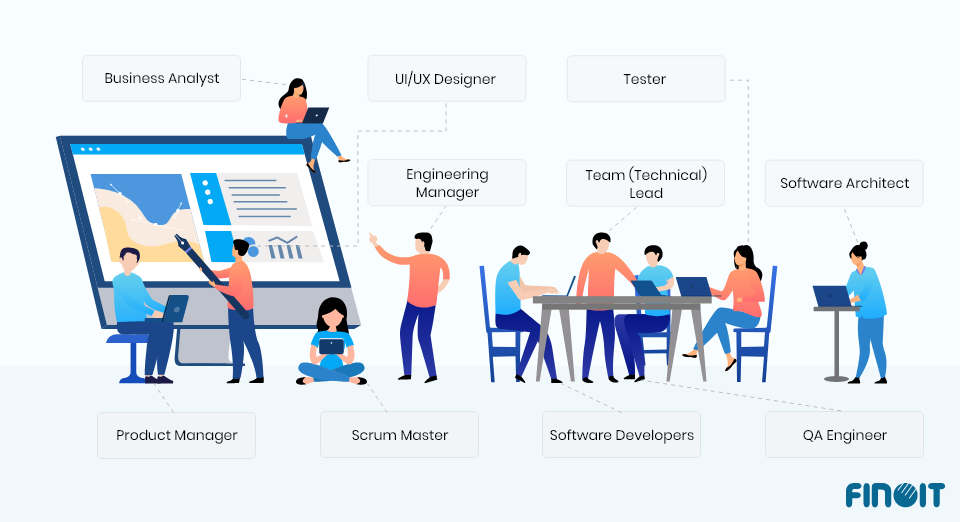
Modern Software Development Team Structure
Ambitious product ideas will need an ambitious software team that comprises a mix of the right talent. It is the software development structure that determines the success of the development project. Here, we discuss all those crucial factors which software development companies take into account when figuring out the most perfect structure.
What is the right team size?
Ideally, an agile team would comprise anywhere between 5 to 11 members. The traditional approach to deciding team size takes into account a higher number. However, with software development approaches leaning towards agile thinking, the average size of teams in software development has shrunk.
While arriving at the right figure for the team size, a software development company will consider several parameters concerning your project. These are:
- How complex is your project?
- What’s the budget for the project?
- What’s the time-to-market you are expecting?
- How would you like to allocate resources?
Software development team structure by role
Traditional team structure called for a hierarchical structure where the product owner i.e., the client would be at the top. He was followed by the project manager, who would manage a team of diverse professionals – developers, testers, business analysts, and designers.
How traditional teams differ from agile teams
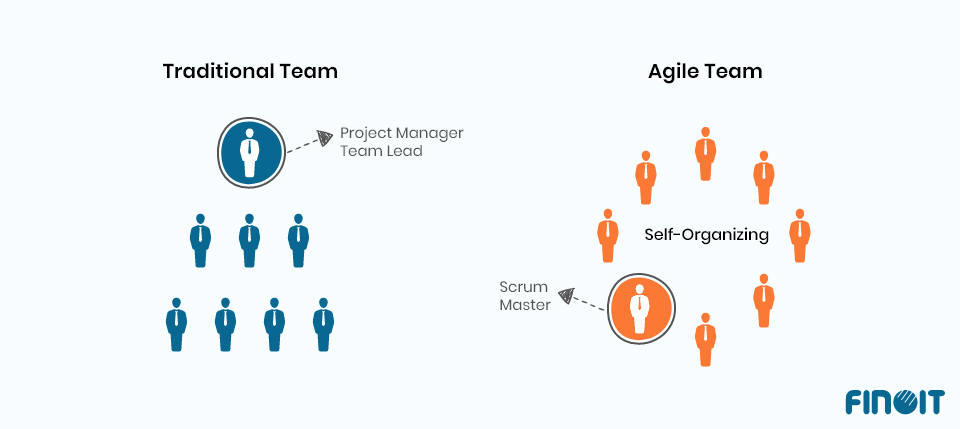
Knowing the Agile Development Team structure
The agile team structure is based on the notion of self-organization and adopts an iterative approach to acquiring an agile character. Scrum Master works as a servant leader who coaches the team in self-management. The focus is on incrementally improving the team’s efficiency with each iteration. So, the team progressively strives to overcome impediments and enhance productivity.
In agile teams, there are core team members as well as external agents. Each role has well-defined responsibilities and the entire team is organized around value – all due to the flexible structure that they adopt.
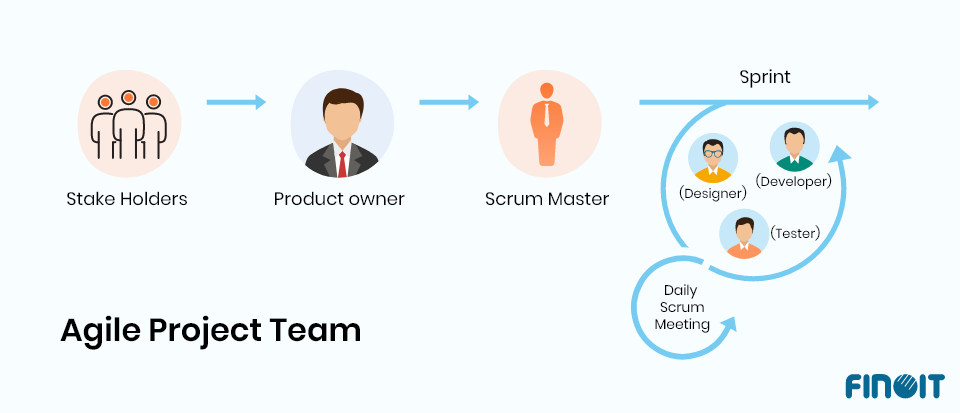
What to look for in a software development team
A great software delivery team is one with great attributes. Ultimately, it is not just developing a product but also setting an impression on the client. So, if you are a business, keen to outsource software development for your next application, here are the qualities that you must look for in the prospective team.
Professionalism
Strong technical skills – programming, testing, wireframing, etc. evidently are present in a software dev team. However, without having a professional attitude, mindset, and approach, the team fails to achieve success. Professionalism is reflected in how team members coordinate with internal and external stakeholders, and conduct themselves as a part of the team.
Great understanding of business rules
A thorough knowledge of business rules helps in conceptualizing the right product. Only those teams succeed that first delve into the details of business rules and align the technical development with them. When the team knows the business rules, it can easily develop business logic for managing data in the project.
Excellent problem-solving skills
Each member has to demonstrate great problem-solving skills – general as well as contextual – for impeccable execution. When a problem/issue arises, individuals must be capable of choosing the best course of action. So, assessing problem-solving skills is essential to assure that the team would be able to drive real-time improvements.
Pragmatic attitude
A highly efficient team rests every single action on scientifically made decisions. Whether it is selecting a technology, applying a tool or framework, or deploying an architecture, the team follows a pragmatic approach. The team members are formally trained and continuously update themselves with the latest skills.
Project Management expertise
Project management skills are a mandate to lead software development projects without risks and optimize project costs. They help in developing a flawless planning framework and offer a clear vision to the team. Against the multi-faceted and complex nature of software development projects, project management expertise facilitates clean delivery of goals.
Creative Spirit
Software development is a creative endeavor, as each project will entail new challenges for software delivery team members. Each product comes from a unique idea – programmers would be writing a new code and UI/UX designers applying their imagination to its best. Each team member will have to discover the best recourse.
Superb documentation and version control skills
Scores of documents are created during the entire software development lifecycle. Meticulous documentation and version control are imperative to establish an audit trail for the update and revision of documents. Following software documentation and version control documentation best practices structurally preserves the information and improves accessibility.
Ability to leverage automation and collaborative platforms
When team members work in a distributed or remote environment, they need to constantly connect with each other. Collaborative platforms streamline this process. Likewise, when members are capable of leveraging automation for handling mundane activities, they free up time that can be utilized for more valuable work.
Now, let’s move on to understand how to set up a dev team.
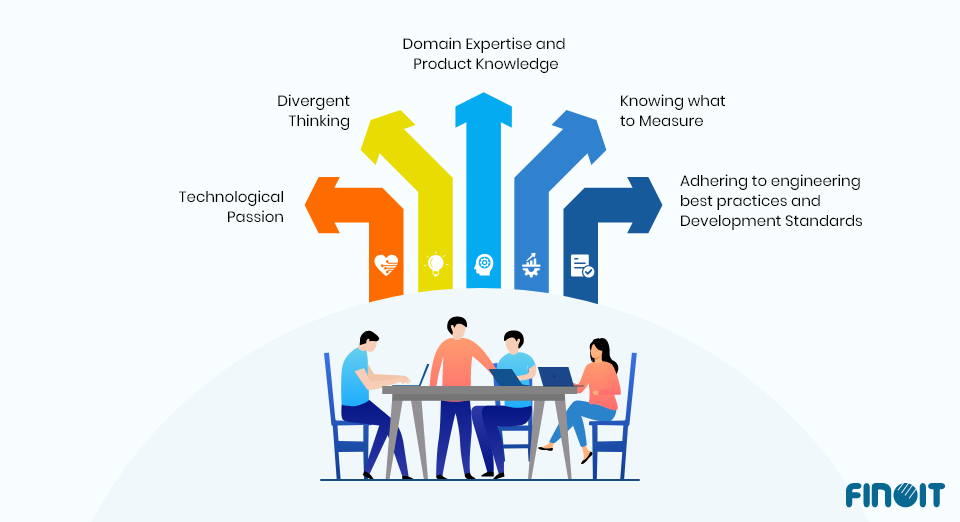
Factors to consider when building a Software Dev Team
Here are the 5 factors which you must strictly consider when looking to set up a software development team:
Know the Project complexities
The complexity of the software development project affects the selection and arrangement of team members. There are several dimensions of project complexity such as how individual team members form interconnections and project scope that directly influence team formation.
Clearly define goals
Aligning the software development project plan with the SMART (specific, measurable, attainable, relevant, and time-bound) principle helps to achieve the set milestones. A diligent team always seeks to tie the goals with the performance metrics and strives to optimize the software development lifecycle.
Take ownership of hiring
Directly or indirectly, the responsibility of building a team will come to you. Even if you aim to outsource software development, let’s say to a software development company from the United States (US), you cannot be oblivious of what team you will have, and therefore must take stock of the team-building process.
Build a cross-functional team
The ability to iterate quickly comes from cross-functionality. An agile team spans different functions, with each expert bringing functional insight toward reaching the common goal. Having a cross-functional team also improves conflict resolution and leaves no room for siloed working.
Consider deadlines and budget
Budget and deadlines are the basic ingredients for defining the financial and periodic dimensions of the project. Teams must be composed against the magnitude of the project and the envisioned finish date as this determines the cost associated with each resource.
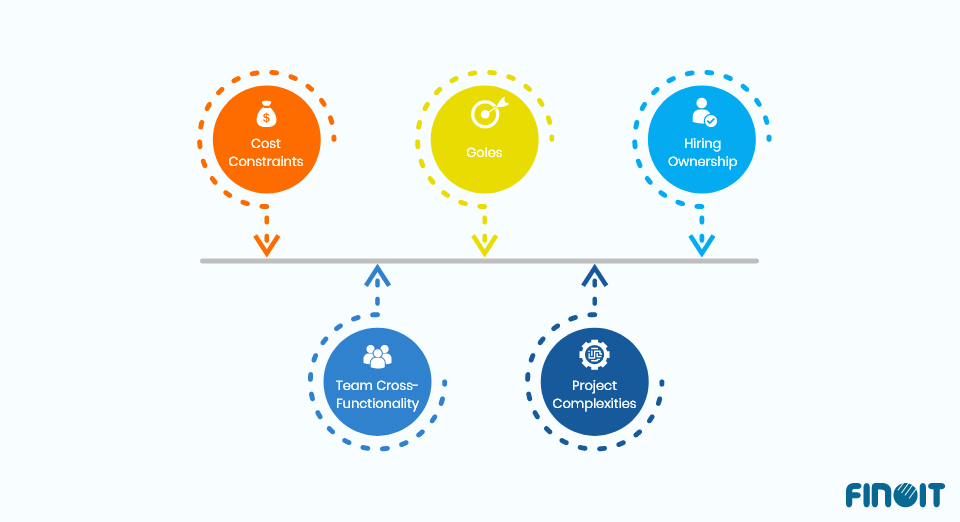
Streamlining Coordination and Communication in Software Delivery Team
Coordination and communication is the foremost challenge that the team must ace to align with the project plan. A good software development company adopts the following measures to streamline communication and ensure smooth coordination.
Adopt Project collaboration tools
Project collaboration tools create a flat structure, where team members are open to brainstorming ideas, discussing alternatives, and forming bespoke groups.
Focus on developing soft skills
Strong soft skills are one of the key factors that determine success in software development. They help a team member empathize with other team members and address problems rightly.
Foster innovation
When team members are encouraged to bring forward their ideas, it creates a positive culture in the team and exposes multiple approaches to reaching the product goal.
Encourage one-to-one interactions
The best way to address critical, unsolvable problems is by allowing team members to have one-to-one interactions, where they can identify the root causes and devise solutions.
Make project information accessible
Project insights must be at the fingertips of team members, or else it would result in deviations. Incorporating information accessibility right from the project start keeps each member in agreement.
Establishing software development team goals
Software development goals give direction to the team and bind them with the commitment made to the business client. In a software development project, the team will have several goals – primary and secondary – which they must achieve over the course of the project.
Technical goals would include code management goals, quality goals, design goals, testing goals, and debugging goals. On the other hand, strategic goals would revolve around leadership goals, teamwork goals, people goals, and professional goals.
At the end of the day, all goals will culminate in the ultimate aim of delivering the best product. In general, the goals for software development team would be as discussed below.
What are the goals of a software development team?
Develop the best product: Quite obviously, you would always want each of the product features to be functional and look for a top-notch solution. Thus, in order to stay ahead in the competition, the goal must not be just meeting the requirements but rather surpassing them.
Produce deliverables in time: Adhering to project schedules through the software development project is the best thing that any software delivery team can do. Delivering in time demonstrates that the team is responsible for project outcomes and sets the benchmark for the team itself.
Set an example by delivering quality output: Delivering a product differs from delivering a quality product in the sense that the latter sets a positive impression in the eyes of the clients. Teams must engage in extensive code reviews and apply the best testing procedures so that each functional aspect is quality validated.
Create a precedent for future projects: The technical efficiency of the team is reflected in how it promotes code reusability, makes it readable, and maintains it. Building reusable architectures work as ready-to-use frameworks for future projects and easily guides team members in adapting to new contexts.
Work securely: Teams must adopt robust systems so as to effectively guard code and data. It must have the ability to develop a deep understanding of different vulnerabilities and strive to ensure utmost security at every stage of the software development pipeline.
Deliver within the allocated budget: The best team devises an immaculate project plan with accurate estimates. Keeping track of each activity against the allocated portion of the budget, the team focuses on not overstepping financial boundaries. Coupled with the product quality, optimal use of resource allocation defines true project success.
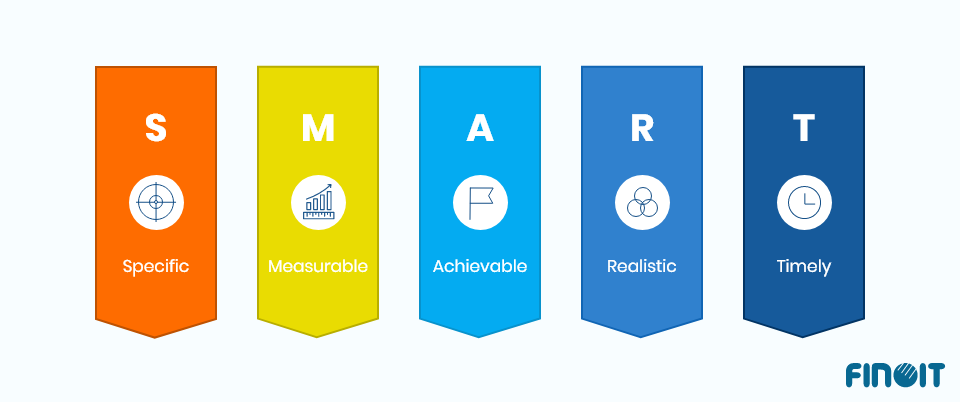
Employ a perfect software development team
A great software dev team is driven by a sense of ownership and invests its effort in creating successful outcomes. After all, it lays the foundation for your future strategies and successes.
However, setting up a good team is just a tiny part of the enduring journey, if you are not an expert in managing inflection points. This especially applies to small and medium businesses (SMBs) that are restricted by resource constraints.
While outsourcing software development is a quick fix, is a quick fix, use the factors we outlined above to choose the prospective team pragmatically. Finoit has been working on diverse software development projects for emerging corporations from the United States, Canada, Europe, and Australia.
To give yourself an edge and work with the best software development professionals in the industry, connect with us.


